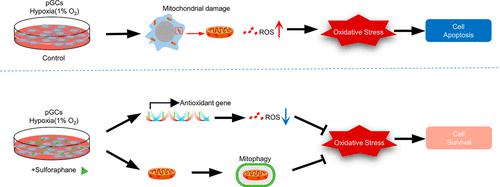当前位置:
X-MOL 学术
›
J. Agric. Food Chem.
›
论文详情
Our official English website, www.x-mol.net, welcomes your
feedback! (Note: you will need to create a separate account there.)
Sulforaphane Acts Through NFE2L2 to Prevent Hypoxia-Induced Apoptosis in Porcine Granulosa Cells via Activating Antioxidant Defenses and Mitophagy
Journal of Agricultural and Food Chemistry ( IF 5.7 ) Pub Date : 2022-06-21 , DOI: 10.1021/acs.jafc.2c01978 Xuan Zhang 1 , Yuanyuan Chen 1 , Hongmin Li 1 , Baobao Chen 1 , Zhaojun Liu 1 , Gang Wu 1 , Chengyu Li 1 , Rongyang Li 1 , Yan Cao 1 , Jiaqi Zhou 1 , Ming Shen 1 , Honglin Liu 1 , Jingli Tao 1
Journal of Agricultural and Food Chemistry ( IF 5.7 ) Pub Date : 2022-06-21 , DOI: 10.1021/acs.jafc.2c01978 Xuan Zhang 1 , Yuanyuan Chen 1 , Hongmin Li 1 , Baobao Chen 1 , Zhaojun Liu 1 , Gang Wu 1 , Chengyu Li 1 , Rongyang Li 1 , Yan Cao 1 , Jiaqi Zhou 1 , Ming Shen 1 , Honglin Liu 1 , Jingli Tao 1
Affiliation

|
In mammals, a vast majority of ovarian follicles undergo atresia, which is caused by granulosa cell (GC) apoptosis. GCs in follicles are exposed to low oxygen. Hypoxia triggers reactive oxygen species (ROS) generation, which leads to cell oxidative stress and apoptosis. Sulforaphane (SFN), a phytochemical isothiocyanate enriched in cruciferous vegetables, has exhibited a crucial role in mitigating oxidative stress. To explore the effect of SFN on porcine GC apoptosis in a hypoxic environment, we handled the established hypoxia model (1% O2) of cultured porcine GCs with SFN. Results showed that SFN rescued hypoxia-induced apoptosis and viability of GCs. Meanwhile, SFN increased the expression of antioxidant enzymes and reduced the accumulation of ROS in GC cytoplasm and mitochondria under hypoxia. Mechanically, SFN activated the transcription factor of redox-sensitive nuclear factor-erythroid 2-related factor 2 (NFE2L2) entering the nucleus, further inducing mitophagy and increased antioxidant capacity, finally alleviating the adverse effect of hypoxia on porcine GCs. In conclusion, SFN inhibited hypoxia-evoked GC apoptosis by activating antioxidant defenses and mitophagy through NFE2L2. New targets may be provided for regulating follicular development and atresia by these findings.
中文翻译:

萝卜硫素通过 NFE2L2 发挥作用,通过激活抗氧化防御和线粒体自噬来防止缺氧诱导的猪颗粒细胞凋亡
在哺乳动物中,绝大多数卵泡发生闭锁,这是由颗粒细胞 (GC) 凋亡引起的。卵泡中的 GC 暴露于低氧环境中。缺氧会触发活性氧 (ROS) 的产生,从而导致细胞氧化应激和细胞凋亡。萝卜硫素 (SFN) 是一种富含十字花科蔬菜的植物化学异硫氰酸酯,在缓解氧化应激方面发挥着至关重要的作用。为了探索SFN在缺氧环境下对猪GC凋亡的影响,我们处理了建立的缺氧模型(1% O 2) 培养的猪 GCs 与 SFN。结果表明,SFN 挽救了缺氧诱导的 GC 细胞凋亡和活力。同时,SFN增加了抗氧化酶的表达,减少了低氧条件下GC细胞质和线粒体中ROS的积累。机械上,SFN激活了进入细胞核的氧化还原敏感核因子-红细胞2相关因子2(NFE2L2)的转录因子,进一步诱导线粒体自噬和增加抗氧化能力,最终减轻了缺氧对猪GCs的不利影响。总之,SFN 通过 NFE2L2 激活抗氧化防御和线粒体自噬来抑制缺氧诱发的 GC 凋亡。这些发现可能为调节卵泡发育和闭锁提供新的靶点。
更新日期:2022-06-21
中文翻译:

萝卜硫素通过 NFE2L2 发挥作用,通过激活抗氧化防御和线粒体自噬来防止缺氧诱导的猪颗粒细胞凋亡
在哺乳动物中,绝大多数卵泡发生闭锁,这是由颗粒细胞 (GC) 凋亡引起的。卵泡中的 GC 暴露于低氧环境中。缺氧会触发活性氧 (ROS) 的产生,从而导致细胞氧化应激和细胞凋亡。萝卜硫素 (SFN) 是一种富含十字花科蔬菜的植物化学异硫氰酸酯,在缓解氧化应激方面发挥着至关重要的作用。为了探索SFN在缺氧环境下对猪GC凋亡的影响,我们处理了建立的缺氧模型(1% O 2) 培养的猪 GCs 与 SFN。结果表明,SFN 挽救了缺氧诱导的 GC 细胞凋亡和活力。同时,SFN增加了抗氧化酶的表达,减少了低氧条件下GC细胞质和线粒体中ROS的积累。机械上,SFN激活了进入细胞核的氧化还原敏感核因子-红细胞2相关因子2(NFE2L2)的转录因子,进一步诱导线粒体自噬和增加抗氧化能力,最终减轻了缺氧对猪GCs的不利影响。总之,SFN 通过 NFE2L2 激活抗氧化防御和线粒体自噬来抑制缺氧诱发的 GC 凋亡。这些发现可能为调节卵泡发育和闭锁提供新的靶点。











































 京公网安备 11010802027423号
京公网安备 11010802027423号